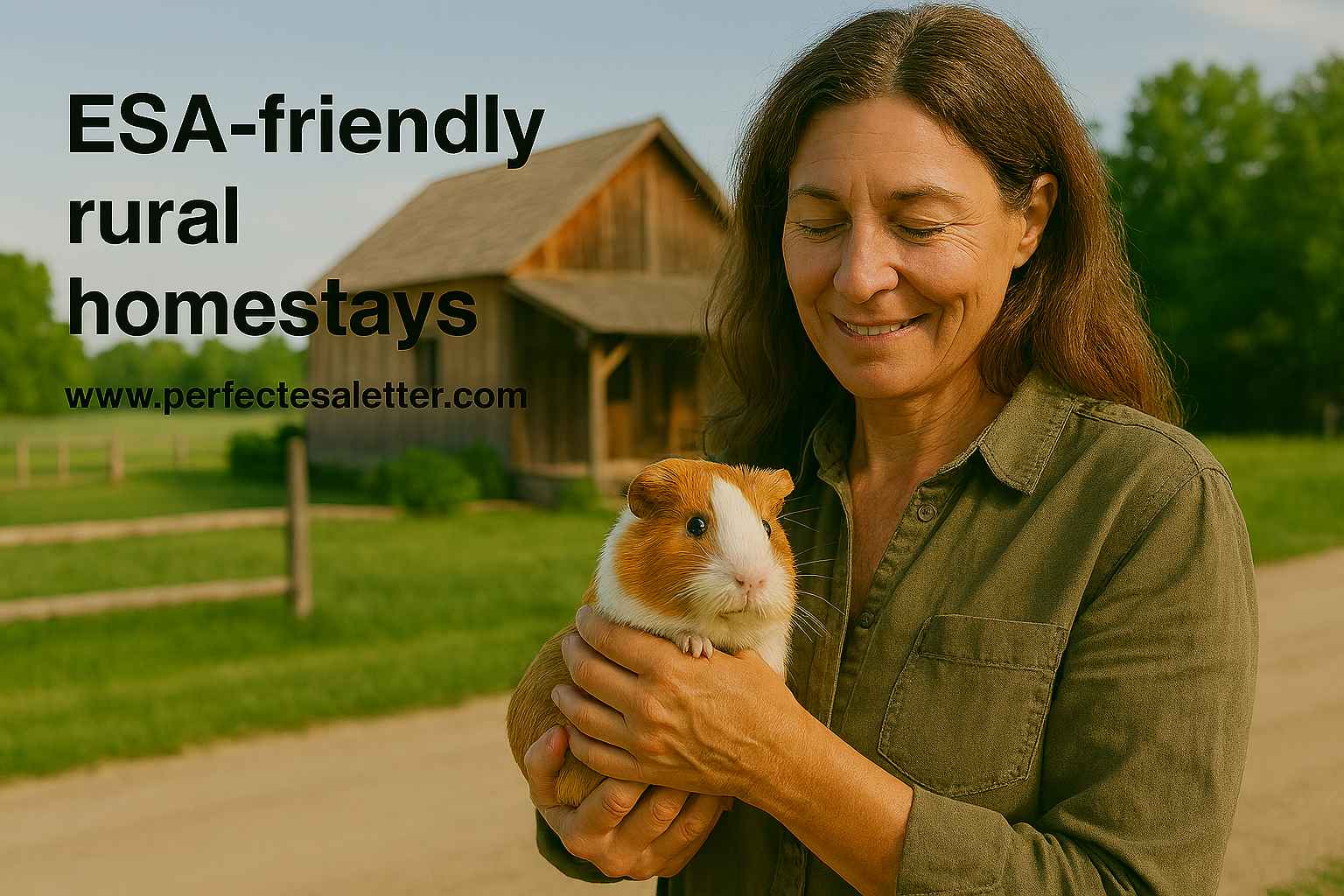ESA-Friendly Rural Homestays: Peaceful Living Options for You and Your Emotional Support Animal
ESA-Friendly Rural Homestays: Peaceful Living Options for You and Your Emotional Support Animal
Introduction
For many ESA owners, city life can feel overwhelming. Noise, crowds, and housing restrictions can increase stress rather than reduce it. That’s why rural homestays are becoming a popular choice for people with Emotional Support Animals (ESAs).
Living in the countryside provides a peaceful, spacious, and ESA-friendly environment that supports both emotional wellness and animal care. But what makes rural homestays ideal for ESA owners, and how do you find the right one?
This article explores the benefits, challenges, and search tips for securing an ESA-friendly rural homestay.
”Get Yours Now!
Don’t wait until a landlord or airline tells you “no pets allowed.” Protect your rights today.
Please fill out this form and our team wil contact you ASAP.
Complete your assessment in minutes , get approved by a licensed professional, and receive your letter within 24 hours.
Why Choose a Rural Homestay for ESA Living?
- Peaceful Environment – Rural living reduces exposure to noise and urban stressors.
- More Space for ESAs – Larger yards, open fields, and walking trails are ideal for animals.
- Supportive Hosts – Many rural landlords are more flexible about animals.
- Closer to Nature – Studies show nature improves mental health, enhancing ESA benefits.
- Community Acceptance – Rural areas often view animals as companions, not nuisances.
ESA Housing Rights in Rural Homestays
Under the Fair Housing Act (FHA), your ESA is legally protected whether you rent in a city high-rise or a country farmhouse.
- Landlords must accommodate ESAs even in “no-pet” homes.
- Pet deposits or fees cannot be charged for ESAs.
- Only a legitimate ESA letter from a licensed mental health professional is required.
This means ESA owners can confidently search for rural rentals without fear of unjust rejection.
Key Features of ESA-Friendly Rural Homestays
When searching for a rural homestay, consider these features:
- Private Outdoor Space – A garden, yard, or pasture for exercise.
- Nearby Veterinary Clinics – Even rural areas need accessible pet healthcare.
- Animal-Tolerant Hosts – Landlords who are comfortable with pets and ESAs.
- Safe Surroundings – Fenced areas or low-traffic roads for outdoor walks.
- Community Attitudes – Neighbors who respect ESA rights.
How to Find ESA-Friendly Rural Homestays
1. Use Specialized Rental Platforms
Websites like Airbnb, VRBO, and homestay networks often allow you to filter for “pet-friendly” or ESA accommodations.
2. Contact Hosts Directly
Before booking, communicate your ESA status and rights. Many rural hosts are supportive once they understand ESA laws.
3. Check Local ESA Housing Directories
Some housing directories list ESA-approved properties, including rural areas.
4. Work with Local Realtors
Rural real estate agents often know ESA-friendly landlords willing to accommodate long-term tenants.
5. Explore Word of Mouth
In small rural communities, networking often works better than online searches.
Benefits of ESA-Friendly Rural Homestays
- Improved Mental Health: Fresh air, silence, and wide-open spaces reduce anxiety.
- Happier ESAs: Animals thrive with more room to roam.
- Lower Housing Costs: Rural rentals are often cheaper than urban apartments.
- Stronger Landlord Relationships: Rural homestay hosts tend to be more personal and flexible.
- Holistic Healing: Combining ESA companionship with nature’s calm creates deeper wellness.
Challenges to Consider
While rural living has many perks, ESA owners should plan for challenges:
- Limited Veterinary Access – Some rural areas lack nearby clinics.
- Transportation – Public transport may be scarce, requiring a car.
- Fewer Rental Options – Smaller housing markets mean fewer listings.
- Internet/Connectivity Issues – Some rural homes lack stable Wi-Fi.
- Weather & Isolation – Rural winters or floods can make travel difficult.
Tips for Success in ESA Rural Homestays
- Always keep a copy of your ESA letter to show landlords or hosts.
- Build good communication with neighbors, explaining ESA rights politely.
- Create a safe outdoor space for your ESA (fencing, shade, water access).
- Research local emergency vet services before moving in.
- Keep your ESA well-trained to avoid disturbances in quiet rural settings.
Case Study: ESA Owner Moving Rural
Example:
Sophie, an anxiety sufferer, lived in a noisy city apartment with her ESA cat. The constant sounds worsened her symptoms.
She decided to rent a rural homestay with a private cottage and large garden. The landlord accepted her ESA without hesitation after she provided a valid letter.
Within weeks, Sophie noticed improved sleep, reduced stress, and a deeper emotional connection with her ESA.
✅ Lesson: A rural homestay can dramatically enhance quality of life for ESA owners.
Future of ESA-Friendly Rural Homestays
- More rural landlords are becoming educated on ESA rights.
- Homestay platforms are adding ESA-specific accommodation filters.
- Governments are promoting accessible housing for ESA owners in rural areas.
As awareness grows, ESA owners will find it easier to secure countryside rentals.
Conclusion
ESA-friendly rural homestays combine the healing power of nature with the unconditional support of ESAs. They provide peace, space, and acceptance that urban areas often lack.
By understanding your legal rights, carefully researching housing options, and preparing for rural challenges, you can create a comfortable home for both you and your ESA.
Living in the countryside with your ESA isn’t just a housing choice—it’s a lifestyle that supports mental health and emotional well-being.
”Get Yours Now!
Don’t wait until a landlord or airline tells you “no pets allowed.” Protect your rights today.
Please fill out this form and our team wil contact you ASAP.
Complete your assessment in minutes , get approved by a licensed professional, and receive your letter within 24 hours.

